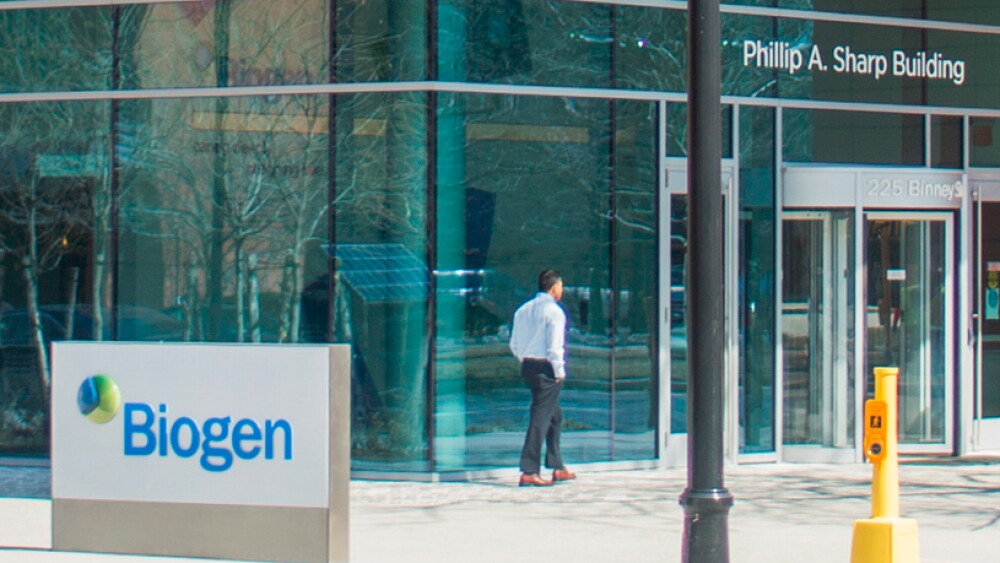April 26, 2017
By Mark Terry, BioSpace.com Breaking News Staff
The predominant theory in Alzheimer’s disease drug research focuses on the elimination of amyloid-beta, the so-called “amyloid hypothesis.” A protein called amyloid-beta has been observed to build up in large quantities in the brains of Alzheimer’s patients. The theory goes then, that if you can eliminate amyloid-beta or prevent it from accumulating, you can treat Alzheimer’s. The problem here is that an awful lot of drugs that seem to effectively eliminate amyloid-beta fail in late-stage clinical trials.
David Liang, writing for The Motley Fool, argues that Biogen , whose aducanumb for AD is a monoclonal antibody designed to clear amyloid-beta, is going to be a failure. Let’s take a look.
In March 2015, Biogen released top-line results from a Phase I trial of aducanumab in AD. It used two dosages, 3-mg and 10-mg. They both led to improved cognitive function. But the 10-mg dose seemed to do a better job. However, there were also more adverse effects associated with the 10-mg dose, notably dangerous brain swelling.
Biogen then launched a trial with 6-mg, hoping it would show more efficacy than the 3-mg dose, but less of the brain swelling. On July 2015, the company announced that the 6-mg dose lacked efficacy and had a worse safety profile than the 10-mg dose.
The company then continued to follow 165 patients in early-stage trials. In December, Biogen released data from this study. In this study, more than 100 patients receiving the drug showed a drop in Alzheimer’s-related beta-amyloid plaque in the brain, as well as a slowing of cognitive decline. Early studies showed brain swelling, but the new data indicated that increasing the dosages incrementally significantly reduced the likelihood of that happening.
Liang is a skeptic, not only of aducanumab, but of the amyloid hypothesis. He writes, “Unfortunately, however, aducanumab is only the latest in a long line of potential AD products which have shown this effect. Back in 2012, Pfizer and Johnson & Johnson ’s bepineuzumab showed a similar ability to clear amyloid plaques from the brain. However, in late-stage trials, while bapineuzumab did continue to clear this plaque, the drug did not demonstrate the ability to slow or halt the underlying progression of AD. Similarly, Eli Lilly’s solanezumab, which also showed promising ability to destroy amyloid, failed in 2016 to demonstrate disease-slowing effects for AD in late-stage clinical trials.”
And Ling is correct, there appears to be growing evidence that clearing amyloid plaques—and several drugs do this effectively—does not result in an improvement in the cognitive decline associated with AD. Perhaps the brain damage has already been done. Perhaps the amyloid hypothesis is incorrect. Perhaps the amyloid-beta accumulation is a symptom of something else, such as some sort of immune dysfunction, which is not being addressed by clearing the proteins.
There’s at least one argument that Biogen is looking at such early-stage AD patients in its Phase III trials, that aducanumab might—if it’s effective—act more as a preventative than a treatment.
On Feb. 28, 2017, another company, Accera, reported that its drug, AC-1204 for AD that was in Phase III, did not demonstrate a statistically significant improvement. AC-1204 utilized a different approach, focusing on deficient glucose metabolism in AD.
Another company to watch is Neurotrope, which is expected to release data from a Phase II clinical trial of bryostatin-1 in AD. Bryostatin-1 is designed to actually repair the damaged synapses caused by AD.
The world awaits an effective treatment for Alzheimer’s disease. It’s entirely possible that what will eventually work is a combination therapeutic, one that clears amyloid-beta, one that promotes acetylcholine, such as Aricept, one that repairs the damage to the synapses, and possibly something to clear the tau tangles that occur later in the disease.
In the meantime, Liang writes, “Although the market is eagerly anticipating Biogen’s pair of aducanumab studies reading out in 2020, I wouldn’t hold my breath. My advice to Biogen? Stick to what you know—multiple sclerosis. My advice to the researchers working on a cure for Alzheimer’s? It’s time for a novel approach.”





